Description
This album contains Bowie’s studio session recordings from 1969 to 1972, which corresponds to his early period. This is a collection of recordings that clearly captures the image of Bowie on the eve of Ziggy, in his youth, when he still retained a sense of innocence but also showed a glimpse of maturity. It is possible to divide Bowie’s era into several periods, but there is no disagreement that the period from “Space Oddity” to the Ziggy era, following the early period, can be roughly positioned as the “early period”. This title contains studio outtakes and alternate versions from those early periods. In terms of albums, this period overlaps with the release of four albums: “Space Oddity”, “The Man Who Sold The World”, “Hunky Dory”, and “Ziggy Stardust”. All of them are different from what can be heard today, making for very interesting content. [DISC ONE] 01. The Wild Eyed Boy From Freecloud This is the single version of the song from the album “Space Oddity” released on June 20, 1969. It starts with acoustic guitar cutting and is a mix that brings Bowie’s vocals to the forefront. Although there are string instruments, the main focus is Bowie’s acoustic guitar singing style. Please compare it with the ostentatious original version. 02. Columbine 03. The Mirror 04. Threepenny Pierrot This is a demo recording for the TV show “Looking Glass Murders” that he appeared on in early 1970. It is rare to have a demo recording for a performance, rather than the actual performance. Both songs are recorded in Bowie’s acoustic guitar style. Both are quiet songs that seem to be influenced by Dylan. Bowie himself seems to be still searching for his own style, changing his voice tone and using humming. Only the last song, “Threepenny Pierrot,” is sung and accompanied by a light piano. The melody is clearly that of the later “London Bye Ta-Ta,” and the lyrics are significantly different, and the song structure is unfinished, but there is no doubt that this is the original song. 05. Prettiest Star 06. Conversation Piece This is the 45 single version released in January 1970. “Prettiest Star” is sung in a restrained and gentle manner. Here too, Bowie’s vocals are brought to the forefront, with a subdued mix of background music. “Conversation Piece” is an idyllic song with a very beautiful melody that was included on the B-side of “Prettiest Star.” 07. Lightning Frightning 08. London Bye Ta Ta THE HYPE is a band that Bowie formed in 1970. These two tracks are from a session with HYPE that took place in January 1970. This is a historic recording in the sense that this encounter with HYPE guitarists Mick Ronson and Tony Visconti would determine Bowie’s sound thereafter. “Lightning Frightning” is a monotonous, monotonous song, with not only guitar and piano in the background, but also an impressive saxophone, making it stand out among his early songs. The previous “Threepenny Pierrot” develops into “London Bye Ta Ta.” With its glittering guitar, rapid-fire piano, and layered chorus work, this is the epitome of glam rock. It’s amazing how that simple piano song can be elevated to such a height. 09. Memory Of A Free Festival Part 1 10. Memory Of A Free Festival Part 2 Contains both sides of the 45 single released in June 1970. It’s a grand song that closes “Space Oddity,” but Bowie himself must have hesitated about how to complete it. Just like the Beatles’ “Strawberry Fields,” it seems that they couldn’t decide between the two versions, and decided to release various versions like this. Although the intro of Part 1 is close to the album version, the guitar soon comes to the forefront, and Bowie sings lightly along with the drums that keep the tempo up. The keyboard breaks in with a flashy punch, and the first half of the song gets exciting early on. Part 2 starts with the ending coda, “Sun Machine is Coming down…”, and is a complete development of this part alone. This fact shows that this song is a completed song that connects two songs together. 11. A Song For Marc Although the title is different, it is clearly the original song of “Lady Stardust.” This is a very early version recorded in May 1970. Although it is a simple performance with only piano, vocals are layered, and it is clear that it is a fairly professional recording. Although it is an early version, the song structure and lyrics themselves were almost completed at this point. 12. All The Madmen This is an outtake from the album The Man Who Sold The World. It is from an acetate recorded in June 1970. It has a clean impression without the slapstick feel of the original. The single vocal also complements this impression. 13. Holy Holy 14. I Tired Of My Life “Holy Holy” is an acetate recording of the 45 single version recorded in June 1970. And “I Tired Of My Life” is a demo recording recorded in May 1970. This melody is unmistakably “It’s No Game”. “Scary Monsters” was released in 1980, so the basic song was already created 10 years before that. The up-tempo momentum of the released version is subdued, and it has a relaxed arrangement. 15. Right On Mother 16. Andy Wahol 17. Rupert The Riley 18. How Lucky You Are 19. Man In The Middle 20. Bombers “Right On Mother” is a short song recorded in the first half of 1971, with piano accompaniment. With clapping, falsetto and humming inserted in the middle, it is a masterpiece that shows off Bowie’s unique style, and allows you to enjoy “Bowie in the Sun”. “Andy Wahol” is an acetate recording of an outtake recorded in March 1971. Unfortunately, it is only the intro, but it is a valuable recording that includes a long part that cannot be heard on the released version. “Rupert The Riley” was recorded on April 23, 1971. It is a catchy song, and although it is somewhat well-crafted with motor sound effects and other things dubbed in, it still feels unfinished. Its connection to the cartoon bear Rupert is unknown. “How Lucky You Are” was recorded in May 1971, and this time you can enjoy the “dark side of Bowie”. Bowie starts singing quietly to the rhythm of the piano, then gradually builds up, and at the climax returns to the quiet piano again, repeating this typical song structure that only Bowie could have. “Man in the Middle” was recorded on June 17, 1971. The main vocals are provided by band members other than Bowie. “Bombers” is an outtake from “Hunky Dory” recorded in June 1971. It is almost finished, and there are no major differences from the released version. [DISC TWO] 01. The Superman Another version recorded in June 1971. The vocals are different, and the arrangement is somewhat cleaner. 02. Quicksand 03. Amsterdam 04. Bombers 05. Kooks 06. Changes The above five songs are demos from “Hunky Dory” recorded in the spring of 1971. The instruments are kept to a minimum, and Bowie’s vocals ring out in your ears, making this a typical demo. There are also some parts where the vocals are double-tracked, which is probably a demo to give instructions to the band members. The demo of “Changes,” one of Bowie’s signature songs, is particularly valuable. This is the earliest version of Bowie’s theme song, which he would sing over and over for the rest of his life, performed only on piano. It is also interesting that he uses the breath sound effect in the intro. 07. Shadowman 08. Looking For A Friend 09. Holy Holy 10. Round And Round 11. Velvet Goldmine 12. Ziggy Stardust 13. Sweet Head Although Bowie released albums with different atmospheres, such as “Space Oddity” with acoustic guitar as the main focus, “The Man Who Sold The World” with guitar as the main focus, and “Hunky Dory” with piano as the main focus, it was probably with “Ziggy Stardust” that he became recognized as a big name. The above five tracks were recorded in September 1971 in a session with SPIDERS FROM MARS, who also produced “Ziggy Stardust”. The sound is more conscious of a band sound centered on guitar than in previous albums. Only the last track, “Ziggy Stardust”, is a demo recording with Bowie alone on acoustic guitar. “Sweet Head” is also a session with SPIDERS FROM MARS, but this recording was recorded in November 1971. 14. All The Young Dudes This is a demo recording from 1972. Originally, this song was written by Bowie for Mott the Hoople, but later, Bowie also performed it on stage, making it one of his signature songs. This song is not only one of Bowie’s signature songs, but also a classic among classics, a hymn to glam rock that has become a rock standard. Although this track is a demo recording, the beauty of its sad melody is undeniable, and even at this simple stage, it already has the atmosphere of a historic masterpiece. 15. White Light White Heat This is a recording of a studio rehearsal held on March 16, 1972. The band was scheduled to hold a concert in Birmingham two days later, and this is thought to be a rehearsal for that purpose. Since this rehearsal was held while the tour was underway, the performance was fulfilling, and the thick guitar sounds exploded, making it a passionate performance just like a real stage. 16. Zion 17. All The Young Dudes (7″ acetate) Finally, this is an outtake from Aladdin Sane, recorded in October 1972. The piano melody in the intro and break of “Zion” was used in Aladdin Sane.But halfway through, the atmosphere changes and an intense guitar cuts in. The lyrics probably haven’t been written yet, Bowie just hits it with la-la-la-la. It sounds like this part is the basis for “Watch That Man”, but I’m not sure. And the last part is “All the Young Dudes” again. It’s a very well-crafted version, as it was a self-cover after the song was already provided to Mott the Hoople in its completed form.
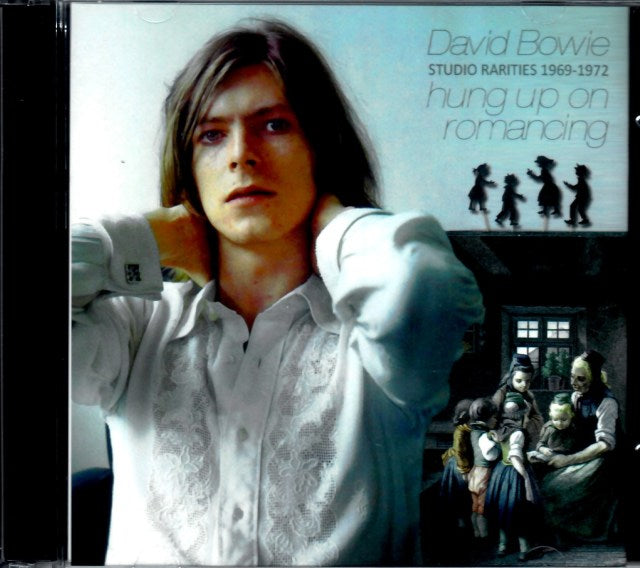

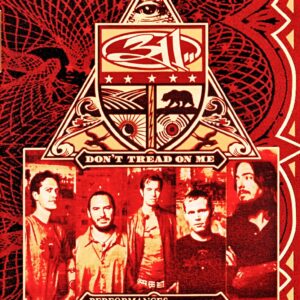
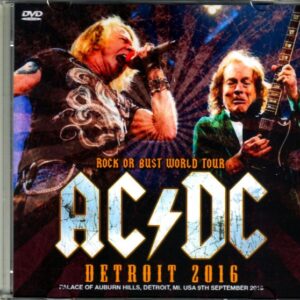
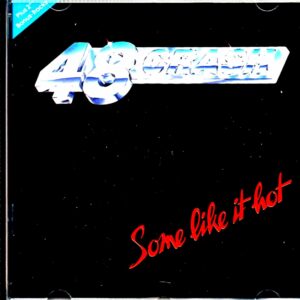
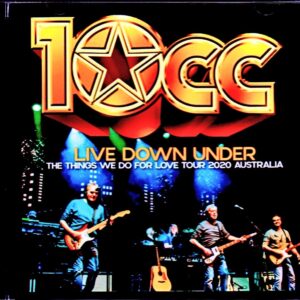
Reviews
There are no reviews yet.